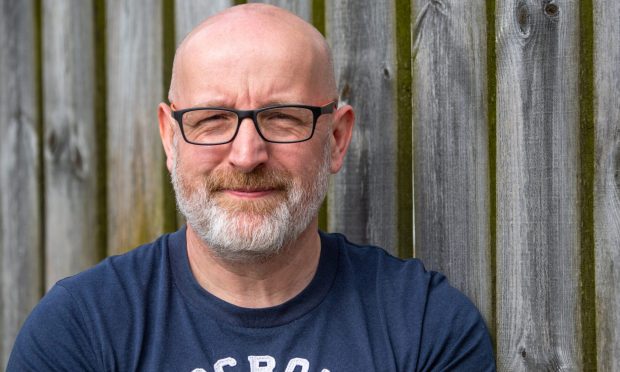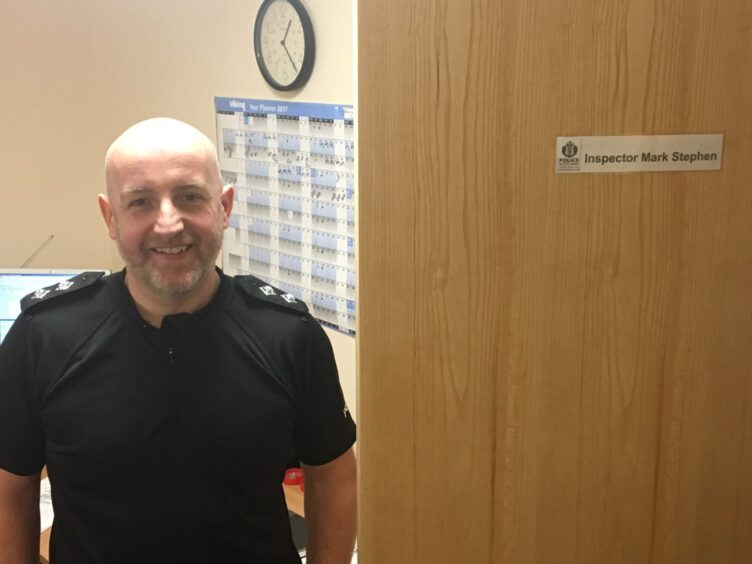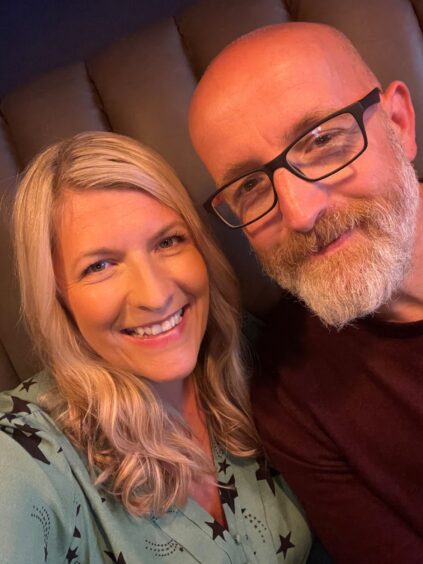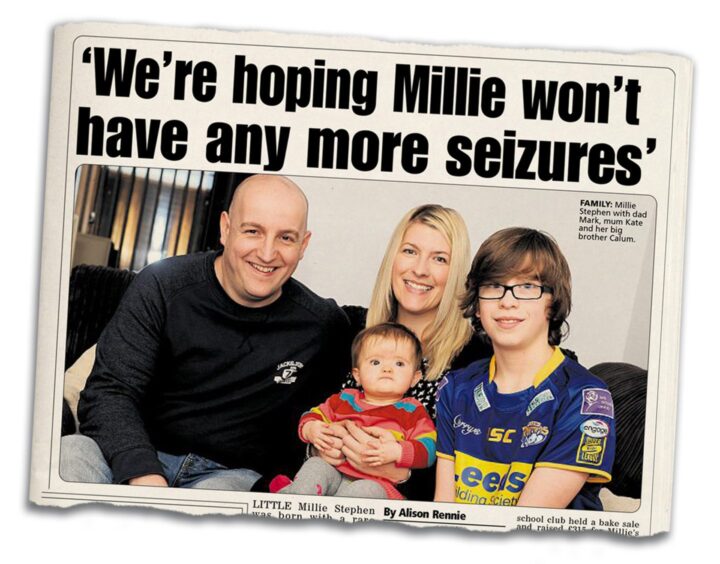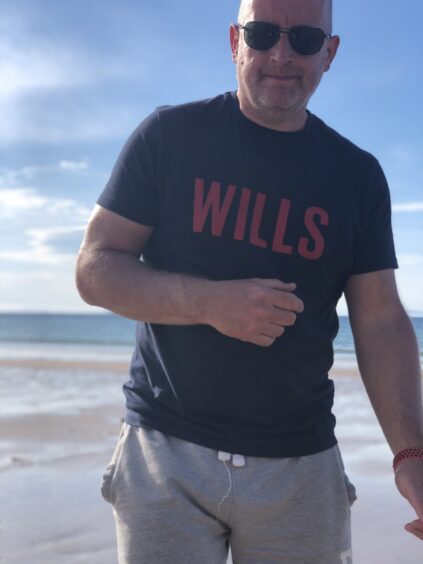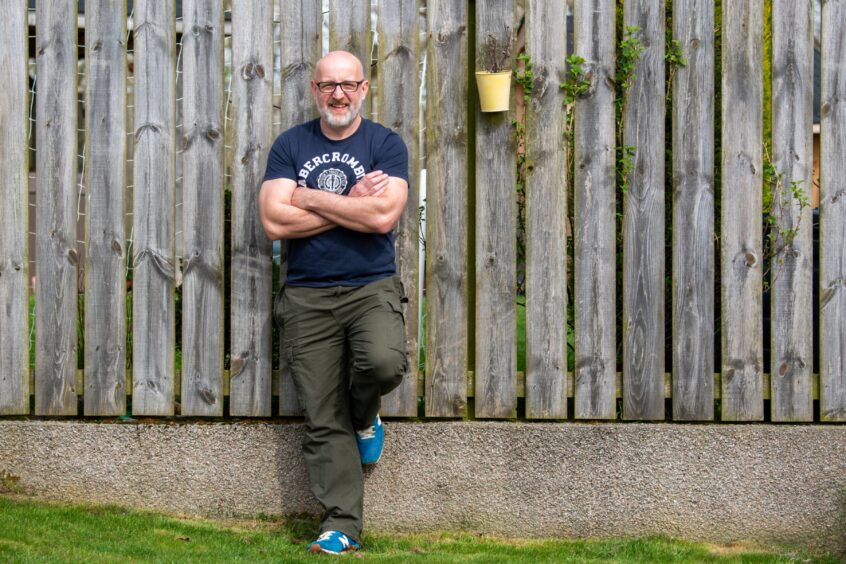As a policeman for 30 years, Mark Stephen regularly dealt with horrifying incidents on the streets of Aberdeen and in the rest of the north-east.
But nothing he encountered then frightened him as much as being told he had prostate cancer.
“Give me a murder or a serious incident,” says Mark, 52, from his home in Udny Green.
“Not that you want them, but you can deal with it. But the minute it became personal and affected me… I found that quite difficult.”
In December 2020, Mark took what he thought was a routine visit to his consultant for a catch-up on surgery he’d had to fix an enlarged prostate. The surgery followed years of issues with bladder control that had made life difficult for an operational cop, so he was hoping for good news.
Instead, the doctor told him there were cancer cells in what they had removed of his prostate.
Mark says what happened next was like a scene from a TV show he once watched in which a man is told he has a brain tumour. All sounds became muffled and the doctor’s voice was suddenly very far away.
“That’s how it felt for me,” explains Mark. “As soon as they said that it was cancer, I can’t remember any of the rest of the conversation.”
Mark faced with a heart scare, Lyme disease and bladder issues
The experience added to Mark’s growing anxiety about his health of which the cancer was just one part.
A few years earlier he’d had a heart scare while road cycling. It was the first time he remembers feeling vulnerable — no longer the fearless police cadet who joined the force in 1991.
Then there were continuing bladder issues. After the surgery on his enlarged prostate he wore a catheter. On a shopping trip with his wife and children, he suddenly wet himself and had to get a bag from a shop to cover the wet patch on his jeans.
Also, a few months before the cancer diagnosis, he contracted Lyme Disease from a tick bite while mountain biking in the woods. As he dealt with the cancer shock, he was also contending with excruciating pain from inflamed joints.
“It completely crippled me for six months,” Mark recalls of the Lyme disease. “So yeah, so when you put the cancer on those other things it’s been quite a few years.”
A chief superintendent wife and a daughter with additional needs
He discovered that dealing with health issues was not the same as coping with the stresses of his job.
At the time he became unwell he was a divisional inspector used to managing large teams on the streets. Policing is the family business — wife Kate is also in the force and in 2022 became the first woman to take over as Chief Superintendent in the north-east, the region’s top job.
Mark had also learned to deal with health issues within his own family. Soon after she was born, his middle child Millie, who is now 13, developed West Syndrome, also known as infantile spasms.
It caused her to have up to 225 seizures a day and she still has significant additional needs and mobility issues that Mark and Kate work with daily.
‘I was snapping at anything’
But suddenly having to deal with multiple health issues of his own was new. He admits he didn’t deal with it well.
“I was really struggling,” he says. “I was snapping at anything and I found that just couldn’t cope. The stress was too much.”
It took an explanation from a psychologist he was assigned by UCAN, the prostate cancer unit at Aberdeen Royal Infirmary, to explain what was happening to him.
“The example they gave me was that you have a pint glass, and your stress goes into it. All of a sudden you’ve poured a hot boiling kettle of water into it and it has poured over.
“So the minute any little piece of stress or anxiety or issue, even if it’s a thimble-full, when it gets poured in it just pours straight back out.
“So what I had to do was to clear that pint glass and get rid of those stress levels.”
Mark starts down the road back to health
Things slowly turned around for Mark.
His Lyme disease symptoms improved, and by March 2020 he was moving properly again.
In terms of his cancer, Mark was relatively fortunate. The surgery had caught it at an early stage — stage one — and his prognosis was good.
Instead of treatment he was put under a so-called ‘active surveillance’ order, which means he gets a scan every three months. Treatment is likely down the road, but not yet.
Mark also went to work on his mental health. In October 2021, he retired from the police and set himself up as a personal trainer at a local gym.
It was a whole new career that quickly gained traction. But while being busy helped at first, eventually he realised it was taking a toll on him.
Six months ago, after more psychology help – this time from a service for retired policemen — Mark took a break from personal training.
The hidden emotional toll of the police
He’s still active, but either in the gym by himself, or in the woods around Udny Green walking Murphy, the family dog
“It just got to the point that I was my I could feel my mental health just deteriorating because it wasn’t I just didn’t do anything for me,” he says.
“But now I’m able to go take the dog to Ballater and do the Seven Bridges walk or go to the beach for a walk.”
He also become more aware of the emotional toll that three decades in the police took on him. He loved his time in the force and says he wouldn’t change a thing about his career, which took him all the way to inspector.
But, he says, when you are in the middle of it you don’t realise the impact of the job.
“You wouldn’t wish on anybody the kind of things that you see or are telling people.
“And there is also an element [when you retire], of one minute you’re in the police and you have all these things to deal with, and the next minute you’re not. You’re just Mr Stephen.”
How a friend signed Mark up to catwalk show Brave
Paradoxically, Mark’s latest attempt at some me-time includes 23 other people.
He is one of this year’s cohort of 24 male models that will stride down the runway for the annual Brave fashion show to raise money for cancer and haematology charity Friend’s of Anchor.
It wasn’t Mark’s idea — a friend threatened to sign him up for the event, which uses models that either have cancer or have some experience of it.
However, as he gears up for the two Brave shows on May 16 and 17, he is grateful he was nudged into it.
“It’s something I look forward to, the excitement leading up to the Wednesday night practices,” he says. “You’re doing something that’s completely alien, going down a catwalk and smiling. However, it’s seeing the inspiration of the other guys that makes you go, right, just live it and do it.
Meanwhile, Mark is making plans. He wants to get back into personal training, with a second retirement planned once wife Kate enacts hers.
And though the past few years have been tough they have given Mark a new perspective on life that he intends to keep.
“Let’s live life to the full,” he says. “Let’s just enjoy. Because you never know what’s going to happen.”
Mark is raising money for Friends of Anchor as part of his Brave experience. You can donate here.
